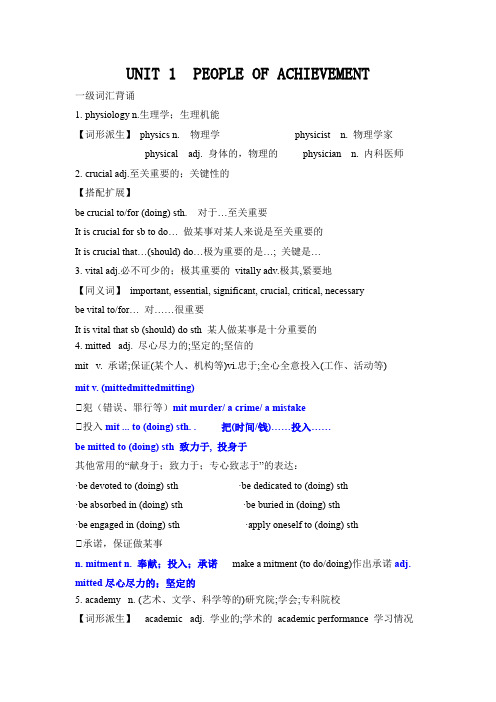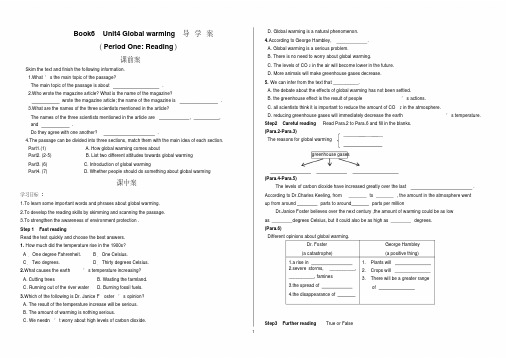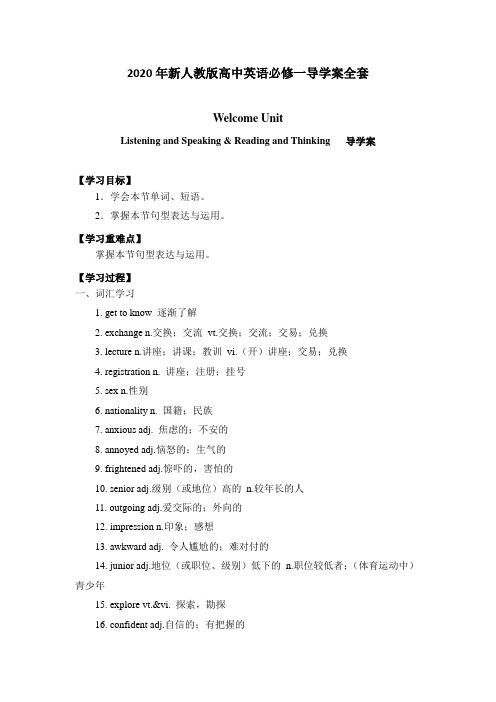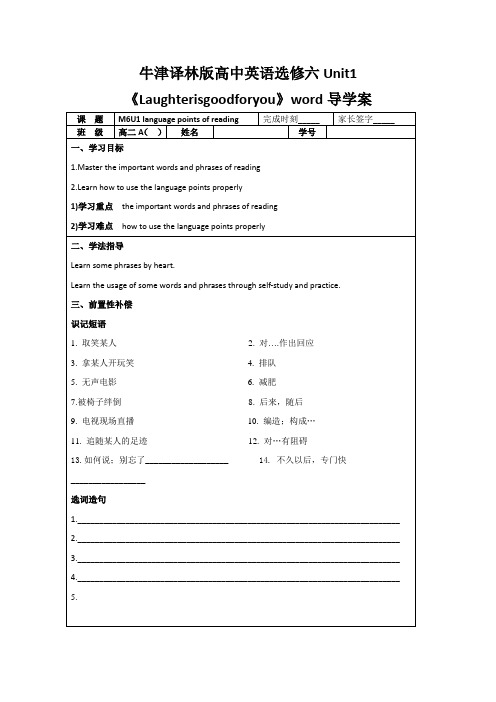高中英语人教版选修六导学案:unit+1导学案
人教版六年级上册英语导学案unit1howcanigetthere

Unit 1 How can I get there?Period One学习目的:1.熟读Let's talk并掌握问路的句型,理解I want to... 构造和what 引导的感慨句。
2.可以听懂Let's try的录音内容并选出正确选项。
一. Review to understand.(温故知新)Answer the questions.(给问句找出答语,将序号写在横线上。
)1.When do you get up? A. I’m drawing a picture.2.What do you do on weekends? B. I usually get up at 6:30.3.Which season do you like? C. I often watch TV.4.When is your birthday? D. It’s in March.5.What are you doing? E. Spring.二.Warm-up〔热身活动〕Read and match.(读一读,连一连。
)1.A.……附近三.Self check(自学检测)1.Look the the picture on Page 4 and write.(看课本4页Let’s talk,补全对话。
)---Robin,Where is the museum shop?________________________.----It's ______________.----Thanks.________________________?I want to send it today.----I don't know. _____________.________________________.----Wow ! _____________.________________________!---- ________________________.----It's _____________the museum.----Thanks.2.Read the above sentences in groups.(四人小组朗读上面的句子,并对同伴做出评价。
Unit1词汇导学案-高中英语人教版选择性

UNIT 1 PEOPLE OF ACHIEVEMENT一级词汇背诵1.physiology n.生理学;生理机能【词形派生】physics n. 物理学physicist n. 物理学家physical adj. 身体的,物理的physician n. 内科医师2.crucial adj.至关重要的;关键性的【搭配扩展】be crucial to/for (doing) sth. 对于…至关重要It is crucial for sb to do… 做某事对某人来说是至关重要的It is crucial that…(should) do…极为重要的是…; 关键是…3.vital adj.必不可少的;极其重要的vitally adv.极其,紧要地【同义词】important, essential, significant, crucial, critical, necessarybe vital to/for… 对……很重要It is vital that sb (should) do sth 某人做某事是十分重要的4.mitted adj. 尽心尽力的;坚定的;坚信的mit v. 承诺;保证(某个人、机构等)vi.忠于;全心全意投入(工作、活动等)mit v. (mittedmittedmitting)①犯(错误、罪行等)mit murder/ a crime/ a mistake①投入mit ... to (doing) sth. . 把(时间/钱)……投入……be mitted to (doing) sth 致力于, 投身于其他常用的“献身于;致力于;专心致志于”的表达:·be devoted to (doing) sth ·be dedicated to (doing) sth·be absorbed in (doing) sth ·be buried in (doing) sth·be engaged in (doing) sth ·apply oneself to (doing) sth①承诺,保证做某事n. mitment n. 奉献;投入;承诺make a mitment (to do/doing)作出承诺adj. mitted尽心尽力的;坚定的5.academy n. (艺术、文学、科学等的)研究院;学会;专科院校【词形派生】academic adj. 学业的;学术的academic performance 学习情况academically adv. 学术上;学业上ic结尾的形容词,变副词时加allydramaticdramatically basicbasically dynamicdynamically【同义词】aim/ goal/ purpose/ intentionwith the objective/purpose/aim of 以……为目的/目标态度观点类常用词:subjective adj. 主观的neutral adj. 中性的;中立的;不带感性色彩的an objective attitude 客观的态度【词形派生】object vi. 反对;不赞成objection n. 不赞成;反对;异议object n. 物体;物品;东西;对象【用法扩展】object to 反对subject n. 科目,学科,主题6.botanical adj. 植物学的botany n. 植物学7.evaluate vt. 评价;评估【用法扩展】evaluate one’s ability/ the cost 评价某人的能力/评估费用evaluate sb. on /by 根据…评价某人【词形派生】evaluation n. 评估;评价【用法扩展】make an evaluation of 对...进行评估selfevaluation 自我评价8.property n. [U]财产;资产[C](常用pl.)性质;特性intellectual property (IP) 知识产权property rights 产权chemical/ physical properties 化学性质/物理性质medical properties 药性“财富,财产”相关名词小聚:①fortune①treasure①wealth①possessions①belongings9.distinct adj. 清晰的;清楚的;有区别的be distinct from 与……不同【派生】distinction n. 区别;差别distinguish v. 区分distinctive adj.独特的,有特色的distinguished adj. 卓越的,杰出的(outstanding)without distinction 无差别地;一视同仁地a singer/writer of distinction 一名杰出的歌手/作家make/draw a distinction between...and... 对……和……加以区分总结:把A与B区分开来make/draw a distinction between A and B= tell/distinguish A from B =tell the difference between A and B =distinguish between A and B10.boil vt.&vi.(使)沸腾;煮开;烧开n.沸腾;沸点分词作定语boiled water 开水boiling water 未开的水developed countries 发达国家developing countries 发展中国家falling leaves 落叶fallen leaves 落叶a retired worker 退休工人an experienced teacher 有经验的老师 a learned man 一个有学问的人11.liquid n. 液体;液体的;液态的【词形派生】steam n. 蒸汽;水汽; gas 气体,天然气,煤气; solid 固体,坚硬的12.obtain vt.(尤指经努力)获得;赢得vi.(规章、习俗等)存在;流行obtain advice/information/promise/knowledge/one’s degree得到忠告/信息/应许获得知识/学位【派生】obtainable adj. 可获得的;可得到的【近义词】acquire, gain , earn13.acknowledge vt. 承认(属实、权威等); (公开)感谢【用法拓展】acknowledge (doing/having done) sth. 承认做了某事acknowledge...as/ to be... 承认... 是...It is universally/ widely acknowledged that... 普遍认为...【派生】acknowledgement n. 承认;确认;鸣谢(常用pl.)14.defeat vt.战胜;打败n. 失败;挫败defeat sb./ an enemy be defeated by 被….打败acknowledge/ admit/ accept defeat 认输15.apparently adv. 显而易见;显然【同义词】obviously/ evidently/ clearly 【派生】apparent adj. 明显的;显而易见的It is/was apparent that… 显而易见的是...16.insist vi. 坚持;坚决要求insist on/upon (sb/sb’s) (doing) sth 坚决要求(某人)(做)某事insist on (doing) sth. 坚持做某事;执意继续做某事insist表示“坚持要求/坚持主张”,接宾从句用虚拟语气insist (that) sb. (should) do sthinsist表示“坚持说/坚持认为”,则宾语从句使用陈述语气insist (that)…[从句的谓语按实际选择时态]My sister insisted that she was right and that I should make an apology to her.My mother insisted that I (should)clean my room first.17.wear and tear (正常使用造成的)磨损;损耗词语拓展:wear out 用坏,穿破;使筋疲力尽→worn out 筋疲力尽的wear well 耐用,耐穿,耐磨18.conclusion n. 结论,推论【用法扩展】arrive at/e to/reach/draw a conclusion 得出结论e to the conclusion that ...得出……的结论in conclusion 最后,总之jump to a conclusion 匆忙下结论bring...to a conclusion 使…结束;使…得出结论【派生】conclude vt. & vi.断定;推断出;得出结论;(使)结束conclude sth. from…从......中推断出19.circumstance n. (常用复数)条件、环境、状况if circumstances permit/allow如果情况允许in/under ... circumstances 在……情况下in/under no circumstances 决不;无论如何不(放在句首,部分倒装)近义短语: “绝不,任何情况都不”:in no case, in no way, on no condition, on no account, at no time20.found vt. 创建;建立(foundedfoundedfounding )【近义词】build, set up, establishbe founded on/upon sth.建立在……基础之上;建在某物之上【派生】foundation n. 基础;地基;创立founder n. 创办者,奠基者lay a solid/ firm foundation for... 为...打下坚实的基础【误区警示】find (发现)—found—found→不规则动词found (建立)—founded—founded→规则动词21.infer vt. 推断,断定(inferredinferredinferring)infer sth (from sth) 从……中推断出it can be inferred that… 可推断出…【派生】inference n.推断;推理draw/make an inference (from…) 以……断定,推断【规律探究】refer, infer, prefer, occur, stir, star 等要双写r后, 再加ed/ing; offer, suffer不双写,直接加ed/ing22.passion n.酷爱;激情;盛怒have a passion for 酷爱be full of passion=be filled with passion 充满激情with passion充满激情地arouse one's passion唤起某人的激情tremble with passion因生气而颤抖get into a passion 突然发怒in a passion 发怒develop a passion for... 对……产生爱好,培养对……的热情【派生】passionate adj. 热情的;有激情的=enthusiastic adj. 热情的be passionate about热衷于某事=be keen on... 热衷于(做)某事=be fondof ...=have a passion for sth.= have an affection for 热爱;深爱23.e to power(开始)掌权;上台【派生】power n. 能力;力量;权力powerful 有力量的powerless 无力量,无权利的【扩展】be in power 掌权,执政have the power to do sth. 有做某事的能力beyond/out of one’s power 某人力所不能及的【联想记忆】out of power 下台out of order 一片混乱out of mind 失去理智out of control 失去控制out of breath 无法呼吸out of curiosity 出于好奇24.consequence n. 结果;后果;影响①as a consequence / in consequence 结果;因此= as a result①as a consequence of / in consequence of 由于..原因= as a result of sth=because of sth.[U]重要(性)( importance )【派生】consequent adj.随之发生的;作为结果的consequently adv.因此;结果=as a consequence25.take up a position 担任;任职【短语扩展】take up接受;开始从事;继续;占据(时间或空间)take off脱掉;起飞;成名;开始成功take in接受;收留;理解;明白;欺骗;吸入take on雇用;呈现(新面貌等);承担take over接管;接收;安排;摆放;陈列26.encounter vt.偶然碰到;遇到n.邂适;遭遇【同义词】e across, run across, run into.encounter problems/difficulties 遇到问题/困难a close encounter with... 近距离接触……have an encounter with... 与……相遇27.remarkable adj. 非凡的;显著的be remarkable for 以……著称【派生】remarkably adv.非常;极为;格外;出乎意料地remark n.谈论;言论;评述make a remark/remarks on/about.….就…..…发表意见;评论…....28.sum n.总数,总和;算术;金额vi & vt 总结;概括The sum of two and two is four.do a sum in one’s headin sum =in short=in a word总之,总而言之a large sum of 一大笔;大量的a large / small sum of moneysum up计算……的总数;总结;概括二、词汇扩展1.mitted adj.尽心尽力的→____________ vt.承诺;保证vi.忠于→___________n.承诺;投入2.academy n.(艺术、文学、科学等的)研究院;学会;专科院校→____________adj.学业的;学术的3.botanical adj.植物学的→____________ n.植物学→__________ n.植物学家4.evaluate vt.评价;评估→____________ n.评价;评估5.distinct adj.清晰的;清楚的;有区别的→____________n.区别6.acknowledge vt.承认(属实);(公开)感谢→____________ adj.公认的→____________ n.承认;感谢7.analyse vt.分析→____________n.分析8.apparently adv.显而易见;看来;显然→___________adj.显而易见的;显然的9.scientific adj.科学(上)的;关于科学的→____________ n.科学→____________ n.科学家10.mostly adv.主要地;一般地→____________pron.大多数11.conclusion n.结论;推论→____________ v.推断;结束12.novelist n.小说家→____________ n.(长篇)小说13.politician n.从政者;政治家;政客→____________ n.政治→____________adj.政治的;党派的14.relativity n.相对论;相对性→____________ adj.相对的→____________ adv.相对地15.gentle adj.温柔的;文静的→____________ adv.轻轻地;温和地→____________ n.温顺;亲切16.passion n.酷爱;激情→____________ adj.狂热的17.extraordinary adj.不一般的;非凡的;意想不到的→____________ adj.普通的;平常的18.gradually adv.逐渐地;逐步地→____________ adj.逐渐的;平缓的19.institution n.社会公共机构;制度;习俗→____________n.(教育、专业等)机构;机构建筑20.consequence n.后果→____________ adj.随之发生的;作为结果的→____________ adv.因此;所以21.remarkable adj.非凡的;显著的→____________ adv.显著地;非常地Part 2:易错动词过去式、过去分词lead__________________ mit___________________________ choose__________________stick__________________draw__________________spread__________________take__________________ quit___________________________ see__________________mistake__________________。
高二英语人教版选修六第一单元学案+答案

(眼睛)瞄准力求达到 针对(2)aim to do sth./aim at doing sth.意欲/企图做某事, 旨在做某事 be aimed at 目的是,旨在,针对 (主语一般是物) be intended to do/for sth. be designed to do/for sth. (同词异构:目的是,旨在)be meant to do /for sth. achieve one’s aim 达到目的 without aim 漫无目的地(1) take aim at 向……瞄准= aim at sth. miss one’s aim 打不中目标,达不到目的 with the aim of 以期……,意在……aim 瞄 准 基本义一、词汇变形Book6 Unit1 Art词汇导学案1. realistic (adj.) 现实的--- real (adj.) ---really (adv.)---reality (n.) ---realize (v.)2. faith (n.) 信心--- faithful (adj.) --- faithfully3. aim (v./n.)---aimless (adj.)---aimlessly(adv.)4. possess (v.) 拥有--- possession (n.)5. predict (v.) 预言--- prediction (n.)6. exhibit (v.) 展出 --- exhibition (n.)7. school--- scholar (n.) 学者--- scholarship8. prefer (v.) 更喜欢--- preferred --- preference(n)8. appeal (v.) 呼吁/ 有吸引力 --- appealing(adj)10. convention(n)习俗; 常规---conventional(adj.)---unconventional(adj.) 11. type(v./n.)---typical(adj.)典型的12.evident(adj.)---evidence(n)证据 13. possess(v.)---possession(n.)财产 14. impress (v.)---impressive(adj.) ---impression(n.)---impressionism(n.) 二、重点单词1.aim v ---impressionist(n.)印象派艺术家 16. critic(n.)评论家---criticize(v.)批评 ---criticism(n.)批评---critical(adj.)批评的,关键的16.carve(v.)雕刻---carving(n.)雕刻品17.effect(n)效果,影响 ---effective(adj)---effectively19. circular(adj.)圆形的---circle(n./v.)圆/盘旋 ---circulate(v.)循环,流传---circulation(n) 20. civil(adj.)国内的---civilize(v.)使文明 ---civilized(adj.)---civilization(n.)文明 21. view(v.)看---vision(n.) 视野 ---visual (adj.)视觉的 22. signature(n.)签字,署名 ---sign(n./v.)标记牌/签字23. adopt(v.)采纳,收养---adoption(n.) 24. specific(adj.)---specifically(adv.) 25. aggressive(adj.)---aggression(n.)侵略 ---aggressiveness(n.)进取精神Denver aimed his gun but did not shoot. The company is aiming at training everybody.*The program aimed at teenagers is well received.take aim at ); 目标,目的(achieve/realize one ’s aim; mi ss one ’s aim)1)*This activity ______(旨在) improving the students’ ability of listening and speaking.2)These educational courses are aimed ___ older people.3)The measures are aimed at ___(prevent) violence.appeal to sb. for sth 呼吁某人做…(call on sb. to do sth.) appeal for mercy 恳求宽恕make/launch an appeal to sb. for sth. 呼吁某人… appeal for aid/help 恳求帮助sth. appeal to sb.吸引某人 (= have appeal for sb. ) lose/drop an appeal 上诉失败/撤诉have hold wide /popular appeal 广受欢迎2. shadow n[C] 影子 When the sun is low, the grand building casts its shadow right across the city. (具体-抽象)阴影/影响 These people have been living for years under the shadow of fear. shadow VS shadeshade 指阳光照不到的地方,如树下或墙边的阴凉处,一般没有具体的轮廓。
人教版高二英语选修6《Unit4Globalwarmingwarming》导学案

Book6 Unit4 Global warming 导学案(Period One: Reading)课前案Skim the text and finish the following information.1.What’s the main topic of the passage?The main topic of the passage is about .2.Who wrote the magazine article? What is the name of the magazine?wrote the magazine article; the name of the magazine is .3.What are the names of the three scientists mentioned in the article?The names of the three scientists mentioned in the article are , , and .Do they agree with one another? .4.The passage can be divided into three sections, match them with the main idea of each section.Part1.(1) A. How global warming comes aboutPart2. (2-5) B. List two different attitudes towards global warmingPart3. (6) C. Introduction of global warmingPart4. (7) D. Whether people should do something about global warming课中案学习目标:1.To learn some important words and phrases about global warming.2.To develop the reading skills by skimming and scanning the passage.3.To strengthen the awareness of environment protection .Step 1 Fast readingRead the text quickly and choose the best answers.1. How much did the temperature rise in the 1900s?A.One degree Fahrenheit. B.One Celsius.C.Two degrees. D.Thirty degrees Celsius.2.What causes the earth’s temperature increasing?A. Cutting treesB. Wasting the farmland.C. Running out of the river waterD. Burning fossil fuels.3.Which of the following is Dr. Janice F oster’s opinion?A. The result of the temperature increase will be serious.B. The amount of warming is nothing serious.C. We needn’t worry about high levels of carbon dioxide.D. Global warming is a natural phenomenon.4.According to George Hambley, .A. Global warming is a serious problem.B. There is no need to worry about global warming.C. The levels of CO2 in the air will become lower in the future.D. More animals will make greenhouse gases decrease.5. We can infer from the text that __________.A. the debate about the effects of global warming has not been settled.B. the greenhouse effect is the result of people’s actions.C. all scientists think it is important to reduce the amount of CO2 in the atmosphere.D. reducing greenhouse gases will immediately decrease the earth’s temperature. Step2 Careful reading Read Para.2 to Para.6 and fill in the blanks.(Para.2-Para.3)The reasons for global warminggreenhouse gases(Para.4-Para.5)The levels of carbon dioxide have increased greatly over the last . According to Dr.Charles Keeling, from to , the amount in the atmosphere wentup from around parts to around parts per millionDr.Janice Foster believes over the next century ,the amount of warming could be as lowas degrees Celsius, but it could also be as high as degrees.(Para.6)Different opinions about global warming.Dr. Foster(a catastrophe)George Hambley(a positive thing)1.a rise in2.severe storms, __________,__________, famines3.the spread of4.the disappearance of1.Plants will2.Crops will3.There will be a greater rangeofStep3 Further reading True or False()1.The temperature in the last century seemed to increase much.()2. Everyone believes that global warming is caused by the activities of humans.()3. The rise in carbon dioxide is causing a steady increase in global warming.()4. George Hambley believes that global warming will do good rather than harm to the earth.()5. It is clear what the effects of global warming will be.Step 4 Fill in the blanks to retell the passage.The temperature of the earth 1 (rise) about one degree during the 20th century. How has this come 2 ? All scientists subscribe 3 the view that it is human activity 4 has caused the 5 (globe) warming rather 6 a random but natural phenomenon. Some scientists think we add large 7 (quantity) of carbon dioxide to the air. Some scientists believe the burning of more and more fossil fuels 8 (have) resulted in the increase of carbon dioxide. Greenhouse gases continue to build 9 . It may be a catastrophe but George 10 (state) that it is a positive thing.Step 5 Free talk — a short speech 能力提升Between the two opinions ,decide on one to have a discussion in you group and then choose a speaker to give a speech on behalf of your group. The following information may help you.Step 6 Summary课后案I.课外延伸阅读Further reading about global WarmingGlobal warming is the unusually rapid increase in Earth’s average surface temperature ove century primarily due to the greenhouse gases released as people burn fossil fuels. The global averagesurface temperature rose 0.6 to 0.9 degrees Celsius (1.1 to 1.6°F) between 1906 and 2005, and the rate of temperature increase has nearly doubled in the last 50 years. Temperatures are certain to go up further.Earth’s natural greenhouse effect Earth’s temperature begins with the Sun. Roughly 30 percent ofincoming sunlight is reflected back into space by bright surfaces like clouds and ice. Of the remaining 70percent, most is absorbed by the land and ocean, and the rest is absorbed by the atmosphere. The absorbedsolar energy heats our planet. As the rocks, the air, and the seas warm, they radiate “infrared radiation). From the surface, this energy travels into the atmosphere where much of it is absorbedby water vapor and long-lived greenhouse gases such as carbon dioxide and methane. When they absorbthe energy radiating from Earth’s surface, microscopic water or greenhouse gas molecules turn into tiny heaters— like the bricks in a fireplace, they radiate heat even after the fire goes out. They radiate in alldirections. The energy that radiates back toward Earth heats both the lower atmosphere and the surface,enhancing the heating they get from direct sunlight. This absorption and radiation of heat by the atmosphere—the natural greenhouse effect—is beneficial for life on Earth. If there were no greenhouseeffect, the Earth’saverage surface temperature would be a very chilly -18°C (0°F) instead of the comfortable 15°C (59°F) that it is today.What has scientists concerned now is that over the past 250 years, humans have been artificiallyraising the concentration of greenhouse gases in the atmosphere at an ever-increasing rate, mostly byburning fossil fuels, but also from cutting down carbon-absorbing forests. Since the Industrial Revolutionbegan in about 1750, carbon dioxide levels have increased nearly 38 percent as of 2009 and methanelevels have increased 148 percent.II.拓展提高书面表达如何解决全球变暖是我们全人类共同面临的一个难题。
2020年新人教版高中英语必修一导学案全套

2020年新人教版高中英语必修一导学案全套Welcome UnitListening and Speaking & Reading and Thinking 导学案【学习目标】1.学会本节单词、短语。
2.掌握本节句型表达与运用。
【学习重难点】掌握本节句型表达与运用。
【学习过程】一、词汇学习1. get to know 逐渐了解2. exchange n.交换;交流vt.交换;交流;交易;兑换3. lecture n.讲座;讲课;教训vi.(开)讲座;交易;兑换4. registration n. 讲座;注册;挂号5. sex n.性别6. nationality n. 国籍;民族7. anxious adj. 焦虑的;不安的8. annoyed adj.恼怒的;生气的9. frightened adj.惊吓的,害怕的10. senior adj.级别(或地位)高的n.较年长的人11. outgoing adj.爱交际的;外向的12. impression n.印象;感想13. awkward adj. 令人尴尬的;难对付的14. junior adj.地位(或职位、级别)低下的n.职位较低者;(体育运动中)青少年15. explore vt.&vi. 探索,勘探16. confident adj.自信的;有把握的17. designer n. 设计师;构思者二、知识运用1. exchange词性:________ 意思:__________词性:________ 意思:__________短语搭配:in exchange (for......)作为(与.......的)交换exchange A for B 以A交换B;把A兑换成Bexchange sth. with sb. 与某人交流/交换某物exchange opinion/ideas/views 交流意见/想法/看法练习:The School of Life has a large number of professional staff who are willing to meet up with you for an hour of chat in exchange ______ a small fee.2. designer(1)词性:_________ 意思:________(2)词性:_________ 意思:________短语搭配:make designs for.....为......做设计by design(=on purpose)故意地design sth. for.......为......设计某物be designer to do.......旨在做.......,用于做........练习:Lucy was born on January 30th, 1998, when her sister got married to a fashion_____(design).3. anxious词性:__________ 意思:________短语搭配:be anxious for sb./about sth. 为某人/某事担心/担忧be anxious for......渴望........be anxious (for sth.) to do sth. 渴望(某人)做某事be anxious that.......渴望(从句谓语用“should + 动词原形”,should 可以省略)练习:She lost her job last month. Therefore, she is anxious_______ (find) a new job.4. annoyed词性:__________ 意思:_________短语搭配:be annoyed with 生某人的气be annoyed at/about sth.因某事生气be annoyed to do 做.......感到生气练习:_______(使我心烦的是)I didn’t have time t o do more reading.5. senior词性:__________ 意思:___________词性:__________ 意思:___________短语搭配: senior high (school)高中be senior to sb. 比某人的地位/职位高练习:My father is my senior _____three years.6. impression词性:__________ 意思:____________短语搭配: have a(n).....impression of.....对.....有......印象leave/make a(n) .......impression on sb.给某人留下.......印象(be)under the impression that......以为.....,(通常指)误认为.......拓展:be impressed with/by sth. 对某事印象深刻;被某事感动impress sth. on sb. 使某人牢记某事be impressed on one’s mi nd/memory 印入某人脑海/记忆中练习:Williams was impressed _______ Benjamin and gave him two classic books on painting to take home.7. confident词性:___________ 意思:____________短语搭配:be confident about对......有信心be confident of (doing) sth. 对(做)......有把握be confident that......确信......拓展:lack of confidence 缺乏自信with confidence 有把握have confidence in......对......有信心have confidence to do sth.有信心做某事。
Unit1 How can we become good learners- 导学案 Section A 3a—3b (阅读课)

Unit1 How can we become good learners? 导学案Section A 1a—2d (听说课)【Study-aims】知识目标:能够初步识记textbook,conversation,aloud,pronunciation,sentence,patient单词和正确使用句型How do you...? By doing sth谈论如何学习和考试。
能力目标:使学生熟练使用句型How do you...? By doing sth谈论如何学习和考试。
情感目标:树立自信,培养坚强的意志,通过各种方式克服学习过程中遇到的困难,并找到适合自己的学习方法。
学习策略:综合培养学生与别人交流和沟通的能力。
文化意识:让学生更多的了解西方国家学生学习的方法。
【Key & difficult points】学习并掌握how 引导的特殊疑问句及其答语,并能流利地运用此句型进行口语交际。
【Learning procedure】I. Pre-class1. 翻译下列短语1) 制作单词卡片2) 向老师求助3)为考试而学习4) 大声朗读5)和小组一起学习6) 口语表达技巧2. 翻译句子:你是怎样学习英语的?______ do you study English?通过听磁带学习英语的。
_______ _______ ______ tapes.3. 知识超市:词汇:patient (adj) “有耐心的” 常用短语:be patient with sb “对某人有耐心”be patient of sth “忍耐某事”(n.) 病人eg:The nurse is patient with the patients.短语:learn a lot that way 用那种方法学到很多for the first time 第一次read word by word 一个词一个词地读read word groups 读词组句型:(1)How do you ...?---By +doing....Eg: How do you study for a test?I study by working with a group.(2)Have you ever studied with a group?(3)What about reading aloud to practice pronunciation?(4) The more you read, the faster you’ll be.“t he +比较级,the +比较级“ 越…越…eg: The more you learn, the more you know.II. While-class1. 导入新课Dear students, do you like studying? Do you want to get good grades? If we want to get good grades, we must become good learners. How can we become good learners? Toda y let’s learn Unit 1. How can we become good learners?2.教学过程(1)学有关“学英语的方法”的短语Eg: by working with friends , by making word cards…. (活动:T: How do I study English? By listening to tapes. What about you? S1: By working with friends. S2: By making word ca rds. …One by one)(2) 使用句型How do you...? By doing sth谈论如何学习和考试。
牛津译林版高中英语选修六Unit1《Laughterisgoodforyou》word导学案

A. no
B. such
C. nearly
D. hardly
4. Each time, he performs his stand-up routine in front of millions of people when
the show is broadcast live on TV.
备注
perform 在此句的意思是 ______________ ,live 的词性是_________ ,意思是
are listening to an observational comedian.
该句是 __________(简单/复合句), 其中 telling jokes about…和 or asking… 作 _______________(成分),people behave 是 __________(成分),queue up 意思是 __________。
牛津译林版高中英语选修六 Unit1
《Laughterisgoodforyou》word 导学案
课 题 M6U1 language points of reading 班 级 高二 A( ) 姓名
一、学习目标
完成时刻_____ 学号
家长签字_____
1.Master the important words and phrases of reading
5.__________________________________________________________________________
四、新知探究
重点单词、词组或句子用法探究:
1. A stand-up comedian may make fun of an audience member, or he or she might
Unit1TeenageLife导学案-高中英语人教版

Teaching & Learning Plan for Unit1 Book 1Teenage lifeAn idle youth, a needy age. Teaching & Learning Plan for Period I, Unit1, Book 1Type: New TeachingPart One: Key petences(核心素养)1.喜欢……多于……2.对……适合的……3.打扫(或清除)干净4.对……负责5.报名(参加课程)6.集中,特别关注7.喜爱 8.对……很入迷C. 熟词生意。
1. content[kən'tent] adj. 满足的;满意的be content with sth对……心满意足She is not content with these explanations.be content to do sth满足于做某事;甘愿做某事A few were content to pay the fines.2.title vt. 加标题于;赋予头衔;把……称为The single is titled “white love”. 这首单曲名为《白色爱情》Part Three: Cooperative Study. 词形变化1.prefer v.→n.______________(喜欢)2.challenge v.→adj.____________(具有挑战性的)3. confuse v.→adj._________(糊涂的;迷惑的)→adj. ______________(难以理解的;不清楚的)4. graduate v.→n._____(毕业;毕业典礼)5. remend v.→n.________(推荐;提议;推荐信)6. advance v.→adj._____(高级的;高等的;先进的)7.obvious adj.→adv._____(显然;明显地)8. responsible adj.→n._________(责任;义务)9.solution n.→v.____(解决;处理)10. adventure n.→adj. ______(有冒险精神的;有新意的)11. survival adj.→v._________(幸存)12. behaviour n.→v._______(表现;表现得体;有礼貌)13. attract v.→n.____________(吸引力;爱慕;吸引)→adj.___________(吸引人的;令人愉快的)14. fluent adj.→n.______(流利,流畅)15. addicted adj.→n._______(对...入迷的人;吸毒成瘾的人)→n.___________ (迷;入迷;嗜好) Part Four: Knowledgeintegrating & Frameworkbuilding词缀: ly (副词后缀,加在形容词后,使其变成副词)词汇拓展①obviously adv.明显地He was obviously drunk. 他显然是醉了。
- 1、下载文档前请自行甄别文档内容的完整性,平台不提供额外的编辑、内容补充、找答案等附加服务。
- 2、"仅部分预览"的文档,不可在线预览部分如存在完整性等问题,可反馈申请退款(可完整预览的文档不适用该条件!)。
- 3、如文档侵犯您的权益,请联系客服反馈,我们会尽快为您处理(人工客服工作时间:9:00-18:30)。
波峰中学高二英语课前作业A姓名班级组别编制陈颖娴时间2017-11 编号12审批樊建【学习目标】Language Aim: Enable students to learn and grasp the important useful new words and expressions.Ability Aim: Get students to use some useful new words and expressions correctly.【目标训练】目标一:课文语法填空As is 1._____________ (know) to all, art is influenced by the customs and faith of a people . 2._____________ (style) in Western art have changed many times.During the Middle Ages, the main aim of painters was 3.______________ (represent) religious themes. 4.______ ______ a result, some pictures at this time were full of religious symbols, 5._____________ created a feeling of respect and love for God.During the Renaissance, people began to concentrate less 6.____________ religious themes and adopt a more humanistic attitude 7.______________ life.In the late 19th century, some painters became the Impressionists. And they were the first painters 8.___________ (work) outdoors.Paintings can reflect the 9.____________ (develop) of civilization, and it is 10.__________(interest) to predict what styles of paintings there will be in the future, why not try to visit some art galleries to appreciate different styles of paintings?1.______________2._____________3._____________4._____________5._______________6.______________7.______________8.____________9._______________ 10._____________ 目标二:单词、短语、重难点突破1.adopt vt. 收养,领养;采纳,采用教材原句:People began to ___________ less on religious themes and __________a more humanistic attitude _________ life.人们开始较少关注宗教主题而采取一种更人性化的生活态度。
adopt a child ___________________________________________adopt a policy/ one’s idea/attitude ___________________________adopt a method/measures __________________________________adopted adj. 收养的adoption n. 收养;采取活学巧练:They treated their __________ (adopt) son as their own son.2.possess vt. 拥有;具有;支配教材原句:Rich people wanted to ____________ their own paintings...富人想拥有他们自己的画......be possessed of 具有(品质、能力等)be in possession of 拥有......(主语为人)be in the possession of (某物)为(某人)所拥有/控制take possession of 占有......come into sb.’s possession 为某人所拥有活学巧练:1)This bookstore is in ________ possession of my sister.2) He took ___________ (possess) of large farm.3.attempt n.&vt. 尝试,努力,试图attempt to do sth. 尝试(做)某事make an attempt to do/at doing sth. 试图做某事at one’s first attempt 首次尝试attempted adj. 尝试的,企图的an attempted murder/escape ______________________________活学巧练:1)I passed my driving test _________ the first attempt.2) He attempted ______________ (escape) from the prison.4.typical adj. 典型的;有代表性的be typical of 是典型的......;是......的特点It is typical of sb. to do sth. 做某事是某人的特点;某人一向如此(做某事)活学巧练:It is typical _______ her to help others in need.5.The Impressionists were the first painters to work outdoors.印象派画家是第一批室外写景的画家。
归纳:序数词the first/the second/ the last (+sb.)+to do 是一种常见的结构,表示“最早、第二、最后做某事的人”,其中的不定式做后置定语;如果主语和不定式之间有被动关系,不定式应使用被动结构。
活学巧练:He was the first farmer ____________ (try) out this method.6.Without the new paints and the new technique, we would not be able to see the many great masterpieces for which this period is famous.没有新的颜料和新的(绘画)手法,我们就不能看到很多使这一时代著名的杰作。
本句也是虚拟语气的一种表达方式:介词短语代替虚拟条件句,用来表达虚拟的事实。
有时表假设的情况隐含在一个由介词或介词短语引起的短语中(如:without, but for, but that 等引起的短语)。
活学巧练:1)Without the air to hold some of the sun’s heat, the earth at night _____________ (be) freezing cold, too cold for us to live.2)But for your help, I _______________ (not finish) the work on time.波峰中学高一英语课前作业B姓名班级组别编制陈颖娴时间 11月编号 12 审批樊建一.单句语法填空。
1.Over the last seventeenth century the painting styles ___________ (change) a great deal.2.He was the first painter ____________ (work) outdoors.3.It took ___________ (little) money to build the house than before.4.This is the masterpiece ___________ he is famous for.5.Mike is allergic __________ fresh flowers.6.It was up to me _________ do the cleaning.7.He visited a lot of places of interest, __________ (include) the West Lake and the Great Wall.8.The beautiful garden is well worth ___________ (visit).9.I missed the train and ____________ (consequent) was late for work.10.He worked very hard and gave a deep __________ (impress) on me.二.短文改错Dear Jack,In your last letter, you asked about how to do with peer pressure. I’m very glad to share my views for you.Peer pressure is common problem for us young student. We often find some people who were better than us in some aspects. For example, they come from a richer family, or they have more than skills. Firstly, I think we must face it rather than avoid it. Secondly, we must know that every one of us is unique and have our own advantages. There is no need to compare ourselves with others. Third, we can learn from those who have special skills. By learning their advantages, we can improve ourselves quick.I hope my advices can help you.Yours sincerelyLi HuaMark:_____________Date:_____________。
